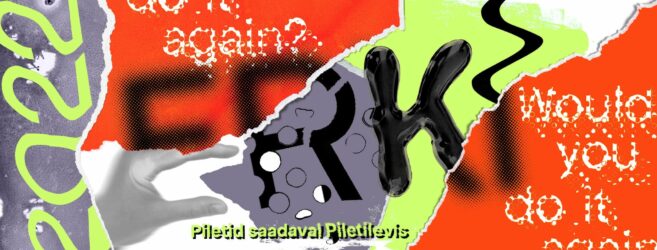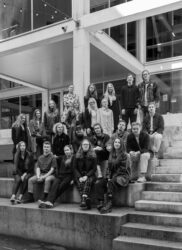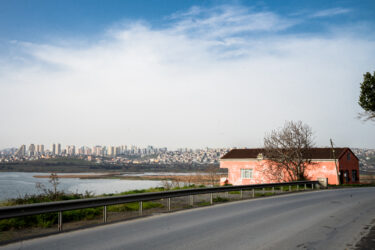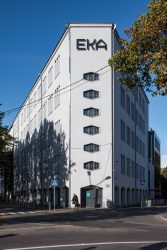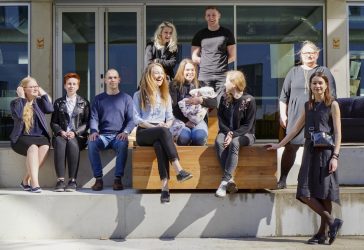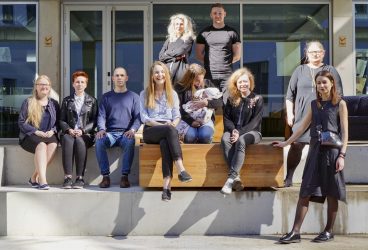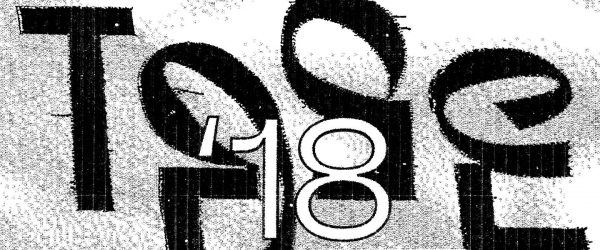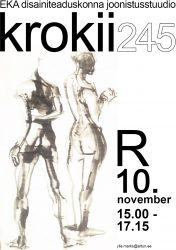Akadeemiline kalender
21.06.2022 — 22.06.2022
EKA LÕPUPIDU 2022
Lõpupidu toimub sel aastal 21. juunil, algusega 19:00 EKA galeriis.
Peale lõpetajate on peole oodatud kõik EKA tudengid, vilistlased ning töötajad. Peole paneb stardipaugu DRAG SHOW. Seejärel astub lavale Arg Part. Tegu on 7-liikmelise muusikalise grupeeringuga, kelle eesmärk on oma muusikaga rahva puusad korralikult võnkuma panna.
Õhtu jätkub DJ’dega, kes keerutavad plaati peo lõpuni. Avatud on EKA X SVETA BAAR, kus Sveta enda baarmenid nii alkohoolseid kui ka virgin kokteile serveerivad. Lisaks kõigele muule on taaskord galerii kõrval avatud fotoboks.
EKA Lõpupidu korraldab Eesti Kunstiakadeemia Üliõpilasesindus.
AJAKAVA:
19:00 – peo algus
19:30-21:00 – Drag Show
21:00-23:00 – Arg Part
23:00-00:00 – DJ Silikaat
00:00-03:00 — DJ YALLAH b2b DJ HOLY MOUNTAIN
EKA LÕPUPIDU 2022
Teisipäev 21 juuni, 2022 — Kolmapäev 22 juuni, 2022
Lõpupidu toimub sel aastal 21. juunil, algusega 19:00 EKA galeriis.
Peale lõpetajate on peole oodatud kõik EKA tudengid, vilistlased ning töötajad. Peole paneb stardipaugu DRAG SHOW. Seejärel astub lavale Arg Part. Tegu on 7-liikmelise muusikalise grupeeringuga, kelle eesmärk on oma muusikaga rahva puusad korralikult võnkuma panna.
Õhtu jätkub DJ’dega, kes keerutavad plaati peo lõpuni. Avatud on EKA X SVETA BAAR, kus Sveta enda baarmenid nii alkohoolseid kui ka virgin kokteile serveerivad. Lisaks kõigele muule on taaskord galerii kõrval avatud fotoboks.
EKA Lõpupidu korraldab Eesti Kunstiakadeemia Üliõpilasesindus.
AJAKAVA:
19:00 – peo algus
19:30-21:00 – Drag Show
21:00-23:00 – Arg Part
23:00-00:00 – DJ Silikaat
00:00-03:00 — DJ YALLAH b2b DJ HOLY MOUNTAIN
11.06.2022
ERKI Moeshow 2022
Eesti Kunstiakadeemia tudengite poolt korraldatav ERKI Moeshow tähistab sel aastal 40. sünniaastat! Tule ja saa sinagi osa Eesti moemaastiku iga-aastasest kõige silmapaistvamast suursündmusest!
Show toimub 11. juunil kell 18 ja pöördub tänavu tagasi oma loomejuurte juurde ehk Eesti Kunstiakadeemiasse. Esitlusele tulevad 15 kollektsiooni nii Eestist kui välismaalt.
Esimestele kiirematele on pilet kuni 22. maini 17€.
Kuni 9. juunini on piletihind 22€.
Päev enne üritust ja toimumispäeval on pilet 27€. Lisaks on võimalik osta väga hinnatud toetajapilet hinnaga 65€.
Sündmus Facebookis
Kohtumiseni ERKI Moeshowl!
ERKI Moeshow 2022
Laupäev 11 juuni, 2022
Eesti Kunstiakadeemia tudengite poolt korraldatav ERKI Moeshow tähistab sel aastal 40. sünniaastat! Tule ja saa sinagi osa Eesti moemaastiku iga-aastasest kõige silmapaistvamast suursündmusest!
Show toimub 11. juunil kell 18 ja pöördub tänavu tagasi oma loomejuurte juurde ehk Eesti Kunstiakadeemiasse. Esitlusele tulevad 15 kollektsiooni nii Eestist kui välismaalt.
Esimestele kiirematele on pilet kuni 22. maini 17€.
Kuni 9. juunini on piletihind 22€.
Päev enne üritust ja toimumispäeval on pilet 27€. Lisaks on võimalik osta väga hinnatud toetajapilet hinnaga 65€.
Sündmus Facebookis
Kohtumiseni ERKI Moeshowl!
02.06.2022 — 03.06.2022
Arhitektuuri ja linnaplaneerimise magistritööde kaitsmised 2022
Tänavused arhitektuuri ja linnaplaneerimise magistritööde kaitsmised toimuvad 2. ja 3. juunil Eesti Kunstiakadeemias ruumis A501.
Tänavu kaitseb oma lõputööd erakordselt palju noori arhitekte – 23!
Kuulata-vaadata saab kohapeal ja ka zoomi vahendusel
AJAKAVA
- juuni
9.00-9.40 MARI POOM “Elada linna taga. Alternatiivid valglinnastumisele ja võrgustikupõhine avalik ruum”. Juhendajad Katrin Koov, Kadri Klementi, Eik Hermann
9.40-10.20 MARKUS MAASING “Valglinnastunud mitte-kohast kompaktse kohani”. Juhendajad Andres Alver, Douglas Gordon, Eik Hermann
10.20-11.00 MIA MARTINA PEIL “Vesse – tööstusalast sidusaks linnaruumiks”. Juhendajad Martin Melioranski, Raul Kalvo, Eik Hermann
11.00 – 11.15 kohvipaus
11.15-11.55 MARIE ANETTE VEESAAR “Koolilähedane liikuvusruum Tallinnas Südalinna kooli näitel”. Juhendajad Martin Melioranski, Raul Kalvo, Eik Hermann
11.55-12.35 LAURA PINT “Elu Keldrimäel. Kasutamata ruumi võimalused”. Juhendajad Katrin Koov, Kadri Klementi, Eik Hermann
12.35-13.15 PATRICK BARBO “Romantika maitsestamine”. Juhendajad Martin Melioranski, Raul Kalvo, Eik Hermann
13.15 – 14.15 lõuna
14.15-14.55 JOANNA LÄTTEMÄGI “Valuoja kogukonnakeskus. Viljandi Lossimägede ja Ugala teatri vahelise ala aktiviseerimine olevate hoonete taaskasutuse kaudu”. Juhendajad Toomas Tammis, Tarmo Teedumäe, Eik Hermann
14.55-15.35 KARIN LAOS “Elamise ruum. Ettepanek”. Juhendajad Toomas Tammis, Tarmo Teedumäe, Eik Hermann
15.35-16.15 LAURA ROHTLAAN “KURU ruum: elamu moodullahendus”. Juhendajad Toomas Tammis, Tarmo Teedumäe, Eik Hermann
16.15 – 16.30 kohvipaus
16.30-17.10 GREGOR JÜRNA “Paik. Sihitud skaleeritavad muutused I-464 tüüpi suurpaneelelamu programmis”. Juhendajad Toomas Tammis, Tarmo Teedumäe, Eik Hermann
17.10-17.50 MARKUS VARKI “Arhitektuurne sisend digiteisiku edasiseks arenguks. Spetsifikatsioon”. Juhendajad Martin Melioranski, Raul Kalvo, Eik Hermann
18.00 – ca 19.30 diskussioon ja esialgne hindamine
- juuni
9.00-9.40 ENELI KLEEMANN “Kodu kontoris Kogukonna juhitud elamumajandus Maakri kvartali näitel”. Juhendajad Laura Linsi, Roland Reemaa, Eik Hermann
9.40-10.20 LIISA ØSTREM “Neljas koht – sallivust toitev ruum”. Juhendajad Laura Linsi, Roland Reemaa, Eik Hermann
10.20-11.00 JORNAS- TOOMAS IISAK “Pärnu Kalamehe Loometehas. Pärnu õlletehase taasmõtestamine”. Juhendajad Toomas Tammis, Tarmo Teedumäe, Eik Hermann
11.00 – 11.15 kohvipaus
11.15-11.55 JOHAN KIRSIMÄE “Kuidas (taas)aproprieerida formaalset ruumi. Kriitilised suunised Soodevahe Pilpaküla näitel”. Juhendajad Laura Linsi, Roland Reemaa, Eik Hermann
11.55-12.35 PAMELA KRISTIN KAJAKAS “Hääbumise variatsioonid keskuse ABC-5 näitel”. Juhendajad Laura Linsi, Roland Reemaa, Eik Hermann
12.35-13.15 RUUBEN-JAAN REKKOR “Toe loomine maastike, hoonete ja kogukondade tugevdamiseks – tegutsemine Pärnu jõe keskjooksul”. Juhendajad Laura Linsi, Roland Reemaa, Eik Hermann
13.15 – 14.15 lõuna
14.15-14.55 SASKIA EPP LÕHMUS “Kohanev kohandamine. Madara kasvukoha aeglane planeerimine”. Juhendajad Katrin Koov, Kadri Klementi, Eik Hermann
14.55-15.35 ANNA SMETANINA “Kollektiivsuse sekkumine. Korterelamurajoonide kollektiivse tegutsemise loomine kasutades hoonete vahelisi ruume”. Juhendajad Laura Linsi, Roland Reemaa, Eik Hermann
15.35-16.15 RA MARTIN PUHKAN “Sotsiaalselt jätkusuutlik Pelguranna”. Juhendajad Katrin Koov, Kadri Klementi, Eik Hermann
16.15 – 16.30 kohvipaus
16.30-17.10 TRISTAN KREVALD “Paljassaare triiv”. Juhendajad Katrin Koov, Kadri Klementi, Eik Hermann
17.10-17.50 LILL VOLMER “Lävi-ruum. Kollektiivse tegevuse ruumid Sillamäel”. Juhendajad Martin Melioranski, Raul Kalvo, Eik Hermann
17.50-18.30 MERILIN KAUP “Praktilised utoopiad”. Juhendajad Katrin Koov, Kadri Klementi, Eik Hermann
18.40 – ca 20.00 diskussioon ja hindamine
ca 20.00 – 22.00 hinnete teatavaks tegemine, komisjoni kommentaarid ja tagasiside
Arhitektuuri ja linnaplaneerimise magistritööde kaitsmised 2022
Neljapäev 02 juuni, 2022 — Reede 03 juuni, 2022
Tänavused arhitektuuri ja linnaplaneerimise magistritööde kaitsmised toimuvad 2. ja 3. juunil Eesti Kunstiakadeemias ruumis A501.
Tänavu kaitseb oma lõputööd erakordselt palju noori arhitekte – 23!
Kuulata-vaadata saab kohapeal ja ka zoomi vahendusel
AJAKAVA
- juuni
9.00-9.40 MARI POOM “Elada linna taga. Alternatiivid valglinnastumisele ja võrgustikupõhine avalik ruum”. Juhendajad Katrin Koov, Kadri Klementi, Eik Hermann
9.40-10.20 MARKUS MAASING “Valglinnastunud mitte-kohast kompaktse kohani”. Juhendajad Andres Alver, Douglas Gordon, Eik Hermann
10.20-11.00 MIA MARTINA PEIL “Vesse – tööstusalast sidusaks linnaruumiks”. Juhendajad Martin Melioranski, Raul Kalvo, Eik Hermann
11.00 – 11.15 kohvipaus
11.15-11.55 MARIE ANETTE VEESAAR “Koolilähedane liikuvusruum Tallinnas Südalinna kooli näitel”. Juhendajad Martin Melioranski, Raul Kalvo, Eik Hermann
11.55-12.35 LAURA PINT “Elu Keldrimäel. Kasutamata ruumi võimalused”. Juhendajad Katrin Koov, Kadri Klementi, Eik Hermann
12.35-13.15 PATRICK BARBO “Romantika maitsestamine”. Juhendajad Martin Melioranski, Raul Kalvo, Eik Hermann
13.15 – 14.15 lõuna
14.15-14.55 JOANNA LÄTTEMÄGI “Valuoja kogukonnakeskus. Viljandi Lossimägede ja Ugala teatri vahelise ala aktiviseerimine olevate hoonete taaskasutuse kaudu”. Juhendajad Toomas Tammis, Tarmo Teedumäe, Eik Hermann
14.55-15.35 KARIN LAOS “Elamise ruum. Ettepanek”. Juhendajad Toomas Tammis, Tarmo Teedumäe, Eik Hermann
15.35-16.15 LAURA ROHTLAAN “KURU ruum: elamu moodullahendus”. Juhendajad Toomas Tammis, Tarmo Teedumäe, Eik Hermann
16.15 – 16.30 kohvipaus
16.30-17.10 GREGOR JÜRNA “Paik. Sihitud skaleeritavad muutused I-464 tüüpi suurpaneelelamu programmis”. Juhendajad Toomas Tammis, Tarmo Teedumäe, Eik Hermann
17.10-17.50 MARKUS VARKI “Arhitektuurne sisend digiteisiku edasiseks arenguks. Spetsifikatsioon”. Juhendajad Martin Melioranski, Raul Kalvo, Eik Hermann
18.00 – ca 19.30 diskussioon ja esialgne hindamine
- juuni
9.00-9.40 ENELI KLEEMANN “Kodu kontoris Kogukonna juhitud elamumajandus Maakri kvartali näitel”. Juhendajad Laura Linsi, Roland Reemaa, Eik Hermann
9.40-10.20 LIISA ØSTREM “Neljas koht – sallivust toitev ruum”. Juhendajad Laura Linsi, Roland Reemaa, Eik Hermann
10.20-11.00 JORNAS- TOOMAS IISAK “Pärnu Kalamehe Loometehas. Pärnu õlletehase taasmõtestamine”. Juhendajad Toomas Tammis, Tarmo Teedumäe, Eik Hermann
11.00 – 11.15 kohvipaus
11.15-11.55 JOHAN KIRSIMÄE “Kuidas (taas)aproprieerida formaalset ruumi. Kriitilised suunised Soodevahe Pilpaküla näitel”. Juhendajad Laura Linsi, Roland Reemaa, Eik Hermann
11.55-12.35 PAMELA KRISTIN KAJAKAS “Hääbumise variatsioonid keskuse ABC-5 näitel”. Juhendajad Laura Linsi, Roland Reemaa, Eik Hermann
12.35-13.15 RUUBEN-JAAN REKKOR “Toe loomine maastike, hoonete ja kogukondade tugevdamiseks – tegutsemine Pärnu jõe keskjooksul”. Juhendajad Laura Linsi, Roland Reemaa, Eik Hermann
13.15 – 14.15 lõuna
14.15-14.55 SASKIA EPP LÕHMUS “Kohanev kohandamine. Madara kasvukoha aeglane planeerimine”. Juhendajad Katrin Koov, Kadri Klementi, Eik Hermann
14.55-15.35 ANNA SMETANINA “Kollektiivsuse sekkumine. Korterelamurajoonide kollektiivse tegutsemise loomine kasutades hoonete vahelisi ruume”. Juhendajad Laura Linsi, Roland Reemaa, Eik Hermann
15.35-16.15 RA MARTIN PUHKAN “Sotsiaalselt jätkusuutlik Pelguranna”. Juhendajad Katrin Koov, Kadri Klementi, Eik Hermann
16.15 – 16.30 kohvipaus
16.30-17.10 TRISTAN KREVALD “Paljassaare triiv”. Juhendajad Katrin Koov, Kadri Klementi, Eik Hermann
17.10-17.50 LILL VOLMER “Lävi-ruum. Kollektiivse tegevuse ruumid Sillamäel”. Juhendajad Martin Melioranski, Raul Kalvo, Eik Hermann
17.50-18.30 MERILIN KAUP “Praktilised utoopiad”. Juhendajad Katrin Koov, Kadri Klementi, Eik Hermann
18.40 – ca 20.00 diskussioon ja hindamine
ca 20.00 – 22.00 hinnete teatavaks tegemine, komisjoni kommentaarid ja tagasiside
30.05.2022
Urban Studies Master’s Thesis Presentation and Defence
10:00-10:10 Introductions
10:10-11:10 (EEST)
Luisa Fernanda Ayala Torres
Precariousness in the Transformation of Labour: Through Working Class Identity in the city of Turin
Between the 1960s and 1980s, nine million Italians migrated from the agricultural regions of Italy to the productive areas of Turin, shaping the periphery of the city from a rural to an industrial area. The Post-War economic boom provided jobs in the northern plants, giving life to a workers’ hegemony and demographic, social, and cultural transformation. This socioeconomic transformation that affected the organisation of workers, labour, political activity, and society in general, was manifested in two cases. The Palace of Labour, an avant-garde building intended to celebrate the struggles of the working class with an exhibition focused on “man and his progress”, and the case of Mirafiori Sud, a working class neighbourhood symbolising the association of workers. In this way, this thesis explores the identity of the working class in the contemporary city of Turin, where security in neoliberal times no longer needs the scope of the protective techniques of the liberal social State, and as a consequence precarization is now the norm. This is reflected in the transformation of labour manifesting itsel through productive connection with others, where labour is not purely characterised by the increasing capitalization of social life but is effectively reflected with others, producing new social relations.
Examined by Alberto Vanolo (University of Turin) and Aro Velmet (University of Southern California)
11.15-12:15 (EEST)
Mira Samonig
the matter of right-wing populism in Polish LGBT-free zones; towards a with-standing xenourbanism?
Almost a third of Poland had been declared an ‘LGBT-free zone’ in 2020, stigmatizing the LGBTIQP+ community as a threat to Polish identity; this labeling remains a reality for many Polish towns. In this thesis, I am turning towards the concept of the ‘LGBT-free zones’ as a case to investigate the material reality of right-wing populism. I seek to develop a third position to a historical or new materialist understanding in order to investigate such material reality. By that, the ways values find physical expression and thus possibly mobilize oppressive attitudes into ever new futures ahead are traced. It becomes quite evident that the way structures of oppression are advanced and maintained within the public realm exists quite dominantly in everyday narratives. In a bottom-up manner, right-wing populism is advanced on the street; yet, it is by far not perceived by everyone. This marks the entry point for sketching out a possible approach to how the discipline of urbanism could position itself in social struggles. Drawing on Helen Hester’s Xenofeminism, the thesis introduces the concept of xenourbanism describing urbanism based on the conceptual notion of solidarity without sameness. I argue that the notion of xeno- as a prefix attached to urbanism focuses on an inherent transformational potential within the current, rendering a perceived unarming reality into a weapon of contestation and by that suggesting trajectories away from paralyzing no-alternative narratives.
Examined by Piotr Plucienniczak (Warsaw Academy of Fine Arts) and Helen Runting (Secretary)
12:25-13:35 (EEST)
Zahaan Khan
Tourism-Led Gentrification: The Case of Dal Lake in Kashmir
The dissertation explores tourism-led gentrification, its causes and the impact on the communities living in and around the ecologically-sensitive region of Dal Lake in Kashmir. The dissertation employs methodological triangulation using interviews, survey and policy document analysis, as methods. The policy document in question is the Srinagar Master Plan 2035 issued by the Srinagar Development Authority. Analysing the correlation between tourism and gentrification in a conflict-torn region and using displacement as a conceptual lens, the thesis maps the socio-cultural and economic aspects of touristification especially in relation to the everyday lives of the communities. The dissertation employs a two-pronged analytical approach by using two categories – land milieu and water milieu – to foreground the patterns and impact of gentrification in and around the lake. The analysis of the land milieu concerns itself with a detailed exploration into Boulevard, the long promenade along the lake’s periphery. It further discusses holiday rentals and issues of mobility and maps the city’s land-use patterns particularly in relation to expansion along the lake’s periphery. The study of the water milieu, on the other hand, is an exploration into the historical houseboats of Kashmir and the local hanji (or haenz) community; foregrounding the issues concerning policies of renovation and relocation of
houseboats. The dissertation also delves into the government’s land use and tourism-driven development plans around the lake, especially post abrogation of
Article 370 of the Indian constitution that gave ‘special status’ to the region.
Examined by Dr Mathew Varghese (Mahatma Gandhi University) and Karlis Ratnieks (EKA)
13:35-14:25 Lunch
14:25-15:25 (EEST)
Egemen Mercanlioglu
THE WORK OF A RIFT: Kanal İstanbul and Turkey’s Authoritarian Neoliberalism
Turkey under the leadership of Recep Tayyip Erdoğan and his Adalet ve Kalkınma Partisi was touted as a paragon of neoliberalism and a burgeoning democracy until the late-2000s. Two decades later, the positive portrayals of the country have decidedly shifted. Turkey is now considered to have retreated from neoliberalism; an emblematic case of authoritarian turn. However, this thesis rethinks authoritarian governance as the kernel of the Erdoğan-led AKP’s brand of neoliberalism. It does so by focusing on a to-be-built urban megaproject, Kanal İstanbul—a 45-kilometer long man-made waterway, aiming to locate İstanbul as a signature node in the global web of flooding money and commodities. Using the megaproject as a lens, the thesis shows how neoliberal reforms in the early-2000s have propelled İstanbul and the construction sector as financial growth generating engines of the country. Subsequently, these
reforms have buttressed contemporary coercive governance structure and a megaproject spree in the city. Finally, the thesis briefly explores a recent but growing counter-hegemonic contestation against Erdoğan and his Kanal İstanbul, posed by the mayor of İstanbul. The thesis does not give a final verdict but explores whether or not this challenge proposes an alternative to authoritarian neoliberalism.
Examined by Dr Cemal Burak Tansel (Newcastle University) and Mattias Malk (EKA)
15:30-16:30 (EEST)
Deniz Taskin
Architecture as a Practice of Care: Case Studies of Women’s Care-Based Architecture Practices
Care as a concept is becoming more crucial in architecture and urban practice as a result of the COVID-19 pandemic’s unpredictable spatial, social, and political circumstances. The attitude of urbanized capitalism towards contemporary urban problems and its refusal to acknowledge the urgency of the climate crisis result in uncaring urban practices. The important position of architecture as a measure for assessing our place in the ecosystem and the role of architects and related disciplines in determining with whom we live together requires them to reconsider the values and priorities that drive their practice. This thesis unpacks care as a concept and ethical practice through a feminist lens by focusing on the notion of “configuration of care,” which refers to how architects express their ethical and political objectives by arranging human and nonhuman materials to achieve caring relationships in urban spaces. (Suchman 2012). It does so by focusing on the practices of women from the field of architecture and related disciplines whose contemporary practice foregrounds care and employs feminist care ethics: Careful Mapping by Spolka, Performing Architherapy by Erika Henriksson, Mutfak (Kitchen) by Merve Bedir, The Blind Alley by Elin Strand Ruin. The thesis explores certain commonalities and recurring patterns of thought in how the practitioners’ encounter and apply feminist care ethics. Finally, it discusses the potential and limits of incorporating feminist care ethics into architecture practice, as well as the potential for architectural practice to become care practice.
Examined by Agata Marzecova (EKA) and Henriette Steiner (University of Copenhagen)
Urban Studies Master’s Thesis Presentation and Defence
Esmaspäev 30 mai, 2022
10:00-10:10 Introductions
10:10-11:10 (EEST)
Luisa Fernanda Ayala Torres
Precariousness in the Transformation of Labour: Through Working Class Identity in the city of Turin
Between the 1960s and 1980s, nine million Italians migrated from the agricultural regions of Italy to the productive areas of Turin, shaping the periphery of the city from a rural to an industrial area. The Post-War economic boom provided jobs in the northern plants, giving life to a workers’ hegemony and demographic, social, and cultural transformation. This socioeconomic transformation that affected the organisation of workers, labour, political activity, and society in general, was manifested in two cases. The Palace of Labour, an avant-garde building intended to celebrate the struggles of the working class with an exhibition focused on “man and his progress”, and the case of Mirafiori Sud, a working class neighbourhood symbolising the association of workers. In this way, this thesis explores the identity of the working class in the contemporary city of Turin, where security in neoliberal times no longer needs the scope of the protective techniques of the liberal social State, and as a consequence precarization is now the norm. This is reflected in the transformation of labour manifesting itsel through productive connection with others, where labour is not purely characterised by the increasing capitalization of social life but is effectively reflected with others, producing new social relations.
Examined by Alberto Vanolo (University of Turin) and Aro Velmet (University of Southern California)
11.15-12:15 (EEST)
Mira Samonig
the matter of right-wing populism in Polish LGBT-free zones; towards a with-standing xenourbanism?
Almost a third of Poland had been declared an ‘LGBT-free zone’ in 2020, stigmatizing the LGBTIQP+ community as a threat to Polish identity; this labeling remains a reality for many Polish towns. In this thesis, I am turning towards the concept of the ‘LGBT-free zones’ as a case to investigate the material reality of right-wing populism. I seek to develop a third position to a historical or new materialist understanding in order to investigate such material reality. By that, the ways values find physical expression and thus possibly mobilize oppressive attitudes into ever new futures ahead are traced. It becomes quite evident that the way structures of oppression are advanced and maintained within the public realm exists quite dominantly in everyday narratives. In a bottom-up manner, right-wing populism is advanced on the street; yet, it is by far not perceived by everyone. This marks the entry point for sketching out a possible approach to how the discipline of urbanism could position itself in social struggles. Drawing on Helen Hester’s Xenofeminism, the thesis introduces the concept of xenourbanism describing urbanism based on the conceptual notion of solidarity without sameness. I argue that the notion of xeno- as a prefix attached to urbanism focuses on an inherent transformational potential within the current, rendering a perceived unarming reality into a weapon of contestation and by that suggesting trajectories away from paralyzing no-alternative narratives.
Examined by Piotr Plucienniczak (Warsaw Academy of Fine Arts) and Helen Runting (Secretary)
12:25-13:35 (EEST)
Zahaan Khan
Tourism-Led Gentrification: The Case of Dal Lake in Kashmir
The dissertation explores tourism-led gentrification, its causes and the impact on the communities living in and around the ecologically-sensitive region of Dal Lake in Kashmir. The dissertation employs methodological triangulation using interviews, survey and policy document analysis, as methods. The policy document in question is the Srinagar Master Plan 2035 issued by the Srinagar Development Authority. Analysing the correlation between tourism and gentrification in a conflict-torn region and using displacement as a conceptual lens, the thesis maps the socio-cultural and economic aspects of touristification especially in relation to the everyday lives of the communities. The dissertation employs a two-pronged analytical approach by using two categories – land milieu and water milieu – to foreground the patterns and impact of gentrification in and around the lake. The analysis of the land milieu concerns itself with a detailed exploration into Boulevard, the long promenade along the lake’s periphery. It further discusses holiday rentals and issues of mobility and maps the city’s land-use patterns particularly in relation to expansion along the lake’s periphery. The study of the water milieu, on the other hand, is an exploration into the historical houseboats of Kashmir and the local hanji (or haenz) community; foregrounding the issues concerning policies of renovation and relocation of
houseboats. The dissertation also delves into the government’s land use and tourism-driven development plans around the lake, especially post abrogation of
Article 370 of the Indian constitution that gave ‘special status’ to the region.
Examined by Dr Mathew Varghese (Mahatma Gandhi University) and Karlis Ratnieks (EKA)
13:35-14:25 Lunch
14:25-15:25 (EEST)
Egemen Mercanlioglu
THE WORK OF A RIFT: Kanal İstanbul and Turkey’s Authoritarian Neoliberalism
Turkey under the leadership of Recep Tayyip Erdoğan and his Adalet ve Kalkınma Partisi was touted as a paragon of neoliberalism and a burgeoning democracy until the late-2000s. Two decades later, the positive portrayals of the country have decidedly shifted. Turkey is now considered to have retreated from neoliberalism; an emblematic case of authoritarian turn. However, this thesis rethinks authoritarian governance as the kernel of the Erdoğan-led AKP’s brand of neoliberalism. It does so by focusing on a to-be-built urban megaproject, Kanal İstanbul—a 45-kilometer long man-made waterway, aiming to locate İstanbul as a signature node in the global web of flooding money and commodities. Using the megaproject as a lens, the thesis shows how neoliberal reforms in the early-2000s have propelled İstanbul and the construction sector as financial growth generating engines of the country. Subsequently, these
reforms have buttressed contemporary coercive governance structure and a megaproject spree in the city. Finally, the thesis briefly explores a recent but growing counter-hegemonic contestation against Erdoğan and his Kanal İstanbul, posed by the mayor of İstanbul. The thesis does not give a final verdict but explores whether or not this challenge proposes an alternative to authoritarian neoliberalism.
Examined by Dr Cemal Burak Tansel (Newcastle University) and Mattias Malk (EKA)
15:30-16:30 (EEST)
Deniz Taskin
Architecture as a Practice of Care: Case Studies of Women’s Care-Based Architecture Practices
Care as a concept is becoming more crucial in architecture and urban practice as a result of the COVID-19 pandemic’s unpredictable spatial, social, and political circumstances. The attitude of urbanized capitalism towards contemporary urban problems and its refusal to acknowledge the urgency of the climate crisis result in uncaring urban practices. The important position of architecture as a measure for assessing our place in the ecosystem and the role of architects and related disciplines in determining with whom we live together requires them to reconsider the values and priorities that drive their practice. This thesis unpacks care as a concept and ethical practice through a feminist lens by focusing on the notion of “configuration of care,” which refers to how architects express their ethical and political objectives by arranging human and nonhuman materials to achieve caring relationships in urban spaces. (Suchman 2012). It does so by focusing on the practices of women from the field of architecture and related disciplines whose contemporary practice foregrounds care and employs feminist care ethics: Careful Mapping by Spolka, Performing Architherapy by Erika Henriksson, Mutfak (Kitchen) by Merve Bedir, The Blind Alley by Elin Strand Ruin. The thesis explores certain commonalities and recurring patterns of thought in how the practitioners’ encounter and apply feminist care ethics. Finally, it discusses the potential and limits of incorporating feminist care ethics into architecture practice, as well as the potential for architectural practice to become care practice.
Examined by Agata Marzecova (EKA) and Henriette Steiner (University of Copenhagen)
21.06.2022
EKA lõpuaktused 2022
EKA 2021/22. õppeaasta lõpuaktused toimuvad teisipäeval, 21. juunil EKA aulas ja galeriis (ruum A101, Põhja pst 7).
- kl 11.00 disainiteaduskond ja kunstikultuuri teaduskond
- kl 15.00 arhitektuuriteaduskond ja vabade kunstide teaduskond
Lõpetajatele on galeriis reserveeritud istekohad (palume 15 min enne algust kohal olla), õnnitlejad saavad istuda aulas, jälgida aktust fuajees ekraanidelt või EKA TV vahendusel online.
EKA lõpuaktused 2022
Teisipäev 21 juuni, 2022
EKA 2021/22. õppeaasta lõpuaktused toimuvad teisipäeval, 21. juunil EKA aulas ja galeriis (ruum A101, Põhja pst 7).
- kl 11.00 disainiteaduskond ja kunstikultuuri teaduskond
- kl 15.00 arhitektuuriteaduskond ja vabade kunstide teaduskond
Lõpetajatele on galeriis reserveeritud istekohad (palume 15 min enne algust kohal olla), õnnitlejad saavad istuda aulas, jälgida aktust fuajees ekraanidelt või EKA TV vahendusel online.
24.08.2020
Lõpuaktused 2020
Vaata selle aasta lõpuaktust siin.
Head lõpetajad,
Teile on reserveeritud istekohad aulas, õnnitlejad saavad aktust jälgida 1. korruse avatud aladele paigutatud ekraanidelt või läbi tv.artun.ee
Lõpuaktused 2020
Esmaspäev 24 august, 2020
Vaata selle aasta lõpuaktust siin.
Head lõpetajad,
Teile on reserveeritud istekohad aulas, õnnitlejad saavad aktust jälgida 1. korruse avatud aladele paigutatud ekraanidelt või läbi tv.artun.ee
04.06.2019 — 05.06.2019
EKA arhitektuuri ja linnaplaneerimise eriala magistritööde kaitsmised 4.-5. juunil
4. ja 5. juunil kaitsevad 11 arhitektuuri ja linnaplaneerimise eriala tudengit oma lõputöid EKA uue maja suures auditooriumis. Kaitsmised on avalikud ja kõik on teretulnud kuulama!
AJAKAVA:
4. juuni 2019
10.00-10.50
Timmo Lass – Valga heaolukeskus / Valga wellness centre
Juhendajad: Toomas Tammis, Tarmo Teedumäe
10.50-11.40
Lauri Läänelaid – Turvaline linnakvartal. Kuidas luua elukeskkonda, mis toetaks turvalist linnaruumi? / Safe city block. How to create living environment that would support safe urban space?
Juhendajad: Martin Melioranski, Raul Kalvo
11.40-12.30
Jaanika Sau – Nägijaid ja mittenägijaid siduv tajumisruum / Multisensory space for the blind and the sighted
Juhendajad: Martin Melioranski, Raul Kalvo
12.30 – 13.30 paus
13.30-14.20
Maili Tannenberg – Suvilaruum linnas. Vaheruumide võimalikud lahendused / Summer space in the city. Possible perspectives of intermediate spaces
Juhendajad: Katrin Koov, Kadri Klementi
14.20-15.30
Liisa Peri – Ühendades inimest ja looma. Loomade varjupaik ja teraapiakeskus / Connecting humans and animals. Animal shelter and therapy center
Juhendajad: Toomas Tammis, Tarmo Teedumäe
15.30-16.20
Jaana Kraus – Siirdumismaastik / Transferring landscape
Juhendajad: Toomas Tammis, Tarmo Teedumäe
———–
5. juuni 2019
10.00-10.50
Annika Valkna – Töö ja elu maal. Üürielupindade lisamine Imavere alevikku / Working and living in the coutryside. Adding rental housing to Imavere
Juhendajad: Toomas Tammis, Tarmo Teedumäe
10.50-11.40
Diana Taalfeld – Tööstuslinn Sindi / Industrial town Sindi
Juhendajad: Andres Alver, Douglas Gordon
11.40-12.30
Uljana Minakova – Maardu Kroodi piirkonna revitaliseerimine / Revitalising Kroodi area in Maardu
Juhendajad: Andres Alver, Douglas Gordon
12.30 – 13.30 paus
13.30-14.20
Ingrid Kaur – Uuesti merele. Otsides võimalusi positiivse arengu suunamiseks Noarootsi rannikualal / To the sea! Seeking positive development-oriented opportunities for Noarootsi coastal region
Juhendajad: Katrin Koov, Kadri Klementi
14.20-15.30
Helmi Marie Langsepp – Ehitamata jätmisest. Mägi, mägiküla ja külalised / On not-building. Mountain, mountain village and visitors
Juhedajad: Katrin Koov, Kadri Klementi
EKA arhitektuuri ja linnaplaneerimise eriala magistritööde kaitsmised 4.-5. juunil
Teisipäev 04 juuni, 2019 — Kolmapäev 05 juuni, 2019
4. ja 5. juunil kaitsevad 11 arhitektuuri ja linnaplaneerimise eriala tudengit oma lõputöid EKA uue maja suures auditooriumis. Kaitsmised on avalikud ja kõik on teretulnud kuulama!
AJAKAVA:
4. juuni 2019
10.00-10.50
Timmo Lass – Valga heaolukeskus / Valga wellness centre
Juhendajad: Toomas Tammis, Tarmo Teedumäe
10.50-11.40
Lauri Läänelaid – Turvaline linnakvartal. Kuidas luua elukeskkonda, mis toetaks turvalist linnaruumi? / Safe city block. How to create living environment that would support safe urban space?
Juhendajad: Martin Melioranski, Raul Kalvo
11.40-12.30
Jaanika Sau – Nägijaid ja mittenägijaid siduv tajumisruum / Multisensory space for the blind and the sighted
Juhendajad: Martin Melioranski, Raul Kalvo
12.30 – 13.30 paus
13.30-14.20
Maili Tannenberg – Suvilaruum linnas. Vaheruumide võimalikud lahendused / Summer space in the city. Possible perspectives of intermediate spaces
Juhendajad: Katrin Koov, Kadri Klementi
14.20-15.30
Liisa Peri – Ühendades inimest ja looma. Loomade varjupaik ja teraapiakeskus / Connecting humans and animals. Animal shelter and therapy center
Juhendajad: Toomas Tammis, Tarmo Teedumäe
15.30-16.20
Jaana Kraus – Siirdumismaastik / Transferring landscape
Juhendajad: Toomas Tammis, Tarmo Teedumäe
———–
5. juuni 2019
10.00-10.50
Annika Valkna – Töö ja elu maal. Üürielupindade lisamine Imavere alevikku / Working and living in the coutryside. Adding rental housing to Imavere
Juhendajad: Toomas Tammis, Tarmo Teedumäe
10.50-11.40
Diana Taalfeld – Tööstuslinn Sindi / Industrial town Sindi
Juhendajad: Andres Alver, Douglas Gordon
11.40-12.30
Uljana Minakova – Maardu Kroodi piirkonna revitaliseerimine / Revitalising Kroodi area in Maardu
Juhendajad: Andres Alver, Douglas Gordon
12.30 – 13.30 paus
13.30-14.20
Ingrid Kaur – Uuesti merele. Otsides võimalusi positiivse arengu suunamiseks Noarootsi rannikualal / To the sea! Seeking positive development-oriented opportunities for Noarootsi coastal region
Juhendajad: Katrin Koov, Kadri Klementi
14.20-15.30
Helmi Marie Langsepp – Ehitamata jätmisest. Mägi, mägiküla ja külalised / On not-building. Mountain, mountain village and visitors
Juhedajad: Katrin Koov, Kadri Klementi
04.06.2018 — 05.06.2018
Arhitektuuri ja linnaplaneerimise osakonna magistritööde kaitsmised!
Arhitektuuri ja linnaplaneerimise osakonna magistritööde kaitsmine
4. juunil kl 9.00-18.30
5. juunil kl 9.00-12.30
Koht: Kanuti Gildi SAAL, Pikk 20
2018. aasta suvel tuleb arhitektuuri ja linnaplaneerimise osakonnas kaitsmisele 14 magistritööd. Kaitsmised toimuvad Kanuti Gildi SAALis ning kuulama on teretulnud kõik, kel teemade vastu huvi. Sissepääs on vaba.
4. JUUNIL
9.00
Paulina Pähn, “Otsides intensiivset tihedust. Strateegiate rakendamine Keldrimäe asumi näitel”
Juhendajad Tarmo Teedumäe ja Toomas Tammis
9.50
Joonas Tanne, “Paldiski linnaplaneering. Visioon tulevikust”. Juhendaja Andres Alver
10.40
Jüri Nigulas, “Kiirlinn. Za’atari põgenike laagri retrospektiivne planeering”. Juhendaja Andres Alver
11.30
Liisa Valdmann, “Koriluskoridor. Linna aineringluse ruumiline kujundamine Tallinna näitel”. Juhendajad Katrin Koov ja Aet Ader
12.20
Kersti Nigols, “Põlvkondadeülene linnaruum – elanike aktiivne vananemine Mustamäe näitel” Juhendajad Tarmo Teedumäe ja Toomas Tammis
Lõuna: 13.10 – 14.10
14.10
Johannes Aasmäe, “Jalakäijate linn Tallinna keskuses”. Juhendajad Renee Puusepp ja Martin Melioranski
15.00
Anne Vingisar, “Tartu ja Mitte-Tartu sümbioos, Emajõe luhaala ja modernistliku tankisilla sõlmpunktis”. Juhendajad Katrin Koov ja Aet Ader
15.50
Marianna Zvereva, “Lasnamäe klindi avamine: maastik kui võrgustik”. Juhendajad Martin Melioranski ja Renee Puusepp
16.40
Arvi Anderson, “Argine Kesk-Eesti”. Juhendajad Martin Melioranski ja Renee Puusepp
17.30
Liis Juuse, “Religioon kui rännak ja otsing. Püha ruumi võimalikud väljendused Pirita-Vastseliina palverännuteel”. Juhendajad Aet Ader ja Katrin Koov
5. JUUNIL
9.00
Kristian Taaksalu, “Thermae Linnahall”. Juhendajad Renee Puusepp ja Martin Melioranski
9.50
Sander Paljak, “Linnasisese matmis- ja mälestamisruumi võimalikkus alternatiivse praktika kaudu”. Juhendad Aet Ader ja Katrin Koov
10.40
Tarmo Kübard, “Tallinna jalgratastumine – jalgrattakultuur ühiskondlike muutuste katalüsaatorina”. Juhendaja Andres Alver
11.30
Veiko Vahtrik, “Taskukohane eluase”. Juhendajad Tarmo Teedumäe ja Toomas Tammis
Arhitektuuri ja linnaplaneerimise osakonna magistritööde kaitsmised!
Esmaspäev 04 juuni, 2018 — Teisipäev 05 juuni, 2018
Arhitektuuri ja linnaplaneerimise osakonna magistritööde kaitsmine
4. juunil kl 9.00-18.30
5. juunil kl 9.00-12.30
Koht: Kanuti Gildi SAAL, Pikk 20
2018. aasta suvel tuleb arhitektuuri ja linnaplaneerimise osakonnas kaitsmisele 14 magistritööd. Kaitsmised toimuvad Kanuti Gildi SAALis ning kuulama on teretulnud kõik, kel teemade vastu huvi. Sissepääs on vaba.
4. JUUNIL
9.00
Paulina Pähn, “Otsides intensiivset tihedust. Strateegiate rakendamine Keldrimäe asumi näitel”
Juhendajad Tarmo Teedumäe ja Toomas Tammis
9.50
Joonas Tanne, “Paldiski linnaplaneering. Visioon tulevikust”. Juhendaja Andres Alver
10.40
Jüri Nigulas, “Kiirlinn. Za’atari põgenike laagri retrospektiivne planeering”. Juhendaja Andres Alver
11.30
Liisa Valdmann, “Koriluskoridor. Linna aineringluse ruumiline kujundamine Tallinna näitel”. Juhendajad Katrin Koov ja Aet Ader
12.20
Kersti Nigols, “Põlvkondadeülene linnaruum – elanike aktiivne vananemine Mustamäe näitel” Juhendajad Tarmo Teedumäe ja Toomas Tammis
Lõuna: 13.10 – 14.10
14.10
Johannes Aasmäe, “Jalakäijate linn Tallinna keskuses”. Juhendajad Renee Puusepp ja Martin Melioranski
15.00
Anne Vingisar, “Tartu ja Mitte-Tartu sümbioos, Emajõe luhaala ja modernistliku tankisilla sõlmpunktis”. Juhendajad Katrin Koov ja Aet Ader
15.50
Marianna Zvereva, “Lasnamäe klindi avamine: maastik kui võrgustik”. Juhendajad Martin Melioranski ja Renee Puusepp
16.40
Arvi Anderson, “Argine Kesk-Eesti”. Juhendajad Martin Melioranski ja Renee Puusepp
17.30
Liis Juuse, “Religioon kui rännak ja otsing. Püha ruumi võimalikud väljendused Pirita-Vastseliina palverännuteel”. Juhendajad Aet Ader ja Katrin Koov
5. JUUNIL
9.00
Kristian Taaksalu, “Thermae Linnahall”. Juhendajad Renee Puusepp ja Martin Melioranski
9.50
Sander Paljak, “Linnasisese matmis- ja mälestamisruumi võimalikkus alternatiivse praktika kaudu”. Juhendad Aet Ader ja Katrin Koov
10.40
Tarmo Kübard, “Tallinna jalgratastumine – jalgrattakultuur ühiskondlike muutuste katalüsaatorina”. Juhendaja Andres Alver
11.30
Veiko Vahtrik, “Taskukohane eluase”. Juhendajad Tarmo Teedumäe ja Toomas Tammis
30.05.2018 — 13.05.2018
TASE ’18 peanäituse avamine juba sel kolmapäeval kell 17!
TASE on Eesti Kunstiakadeemia igakevadine lõputööde festival, mille peanäitus toimub sel aastal EKA vabade kunstide teaduskonna hoones aadressil Lembitu 10. Näitus avatakse 30. mail kell 17.00 ning külastajaid oodatakse lõputöödega tutvuma kuni 13. juunini.
Näitust võib pidada hüvastijätutseremooniaks erinevatele ajutistele pindadele, kus EKA on peale Tartu mnt 1 õppehoone lammutamist tegutsenud. Lembitu tn 10 hoones on õppe ja -loometöö kestnud viimased neli aastat ning TASE ’18 peanäitusega on tudengitel võimalus oma lõputöid näidata ruumides, millest lahkudes jätab sümboolselt ka kogu Kunstiakadeemia selja taha ühe peatüki.
Näitusel osalevad vabade kunstide, arhitektuuri, disaini ja kunstikultuuri magistrantuuri lõpetajad, aga lisaks näitavad oma taset ka vabade kunstide bakalureusetaseme lõpetajad.
Lisainfo www.artun.ee/tase
TASE ’18 peanäituse avamine juba sel kolmapäeval kell 17!
Kolmapäev 30 mai, 2018 — Pühapäev 13 mai, 2018
TASE on Eesti Kunstiakadeemia igakevadine lõputööde festival, mille peanäitus toimub sel aastal EKA vabade kunstide teaduskonna hoones aadressil Lembitu 10. Näitus avatakse 30. mail kell 17.00 ning külastajaid oodatakse lõputöödega tutvuma kuni 13. juunini.
Näitust võib pidada hüvastijätutseremooniaks erinevatele ajutistele pindadele, kus EKA on peale Tartu mnt 1 õppehoone lammutamist tegutsenud. Lembitu tn 10 hoones on õppe ja -loometöö kestnud viimased neli aastat ning TASE ’18 peanäitusega on tudengitel võimalus oma lõputöid näidata ruumides, millest lahkudes jätab sümboolselt ka kogu Kunstiakadeemia selja taha ühe peatüki.
Näitusel osalevad vabade kunstide, arhitektuuri, disaini ja kunstikultuuri magistrantuuri lõpetajad, aga lisaks näitavad oma taset ka vabade kunstide bakalureusetaseme lõpetajad.
Lisainfo www.artun.ee/tase
10.11.2017
EKA disainiteaduskonna joonistusstuudio krokii reedeti kell 15
Plakatil on kasutatud Külli Triin-Laaneti joonistust.
EKA disainiteaduskonna joonistusstuudio krokii reedeti kell 15
Reede 10 november, 2017
Plakatil on kasutatud Külli Triin-Laaneti joonistust.


